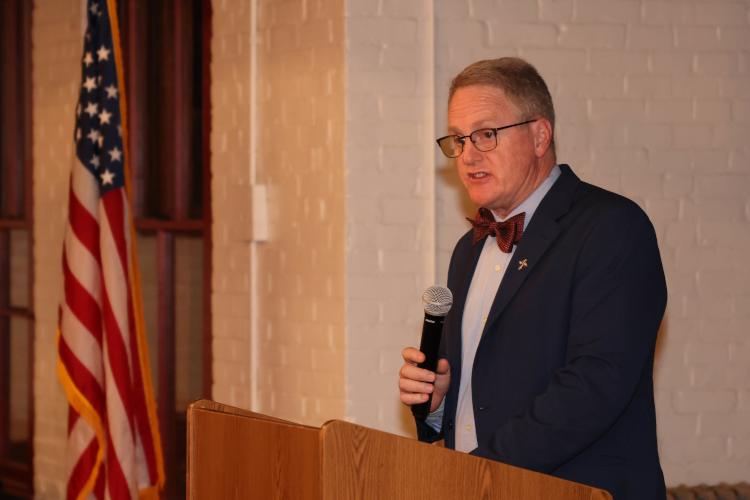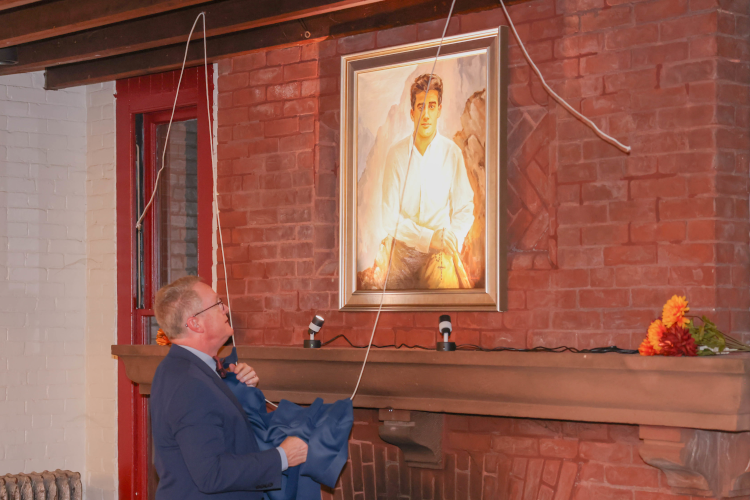- Home
-
About
 Fidelity & Excellence
Fidelity & ExcellenceThomas Aquinas College is unique among American colleges and universities, offering a faithfully Catholic education comprised entirely of the Great Books and classroom discussions.
-
A Liberating Education
 Truth Matters
Truth MattersTruth, and nothing less, sets men free; and because truth is both natural and supernatural, the College’s curriculum aims at both natural and divine wisdom.
-
A Catholic Life
 Under the Light of Faith
Under the Light of FaithThe intellectual tradition and moral teachings of the Catholic Church infuse the whole life of Thomas Aquinas College, illuminating the curriculum and the community alike.
-
Admission & Aid
 Is TAC Right for You?
Is TAC Right for You?Do you enjoy grappling with complex questions? Are you willing to engage in discussions about difficult concepts, with the truth as your ultimate goal?
-
Students & Parents
 Mind, Body & Spirit
Mind, Body & SpiritThere is always something to do at TAC — something worthwhile, something fulfilling, and something geared toward ever-greater spiritual and intellectual growth.
-
Alumni & Careers
 What Can You Do with a Liberal Education?
What Can You Do with a Liberal Education?Nothing speaks more to the versatility of the College’s academic program than the good that our alumni are doing throughout the Church and the world.
- Search
- Giving
Dean Cain’s Thanksgiving Remarks: “A Preponderance of the Good”

By Dr. Steven Cain
Dean
Thomas Aquinas College, New England
Remarks at the Thanksgiving Dinner
November 24, 2024
The Thanksgiving Proclamation that was read at the beginning of this gathering was made by President Calvin Coolidge, early in his presidency following the death of President Harding. I had not realized, until I was tasked with making remarks at this dinner, that there have been many Presidential Thanksgiving Day Proclamations. That led me to look into some of them that I was unfamiliar with, and I turned to Calvin Coolidge because of his connection to this area.
President Coolidge was born in Vermont and served as the governor of Massachusetts before being elected vice president, and then president, and he died not far from here in Northampton. I chose to have us begin with this proclamation of his, not because it is the rhetorical equal of the proclamations that were given by Washington or Lincoln. That would be hard to attain. But I was struck by one thing that he says and which I thought was worth us pausing on for a few moments this evening. He begins by extolling the custom our country has of celebrating this holiday. He says:
To center our thought in [the way Thanksgiving leads us to do] upon the favor which we have been shown has been altogether wise and desirable. It has given opportunity justly to balance the good and the evil which we have experienced. In that we have never failed to find reasons for being grateful to God for a generous preponderance of the good. Even in the least propitious times, a broad contemplation of our whole position has never failed to disclose overwhelming reasons for thankfulness.
I think it was the use of the word preponderance that caught my attention. It brought to mind a scene in the Iliad that never fails to impress me.
When Priam comes to meet Achilles, upon their first coming together, they break down and cry — Priam for his son, Hector, and Achilles for his father, Peleus, whom he knows he will be leaving on his own in his old age. But when they have finished their weeping, Achilles addresses Priam, and points out to him that:
At the door of Zeus
are those two urns of good and evil gifts
that he may choose for us; and one for whom
the lightning’s joyous king dips in both urns
will have by turns bad luck and good. But one
to whom he sends all evil — that man goes
contemptible by the will of Zeus.
(Bk XXIV, ll. 634-40, Fitzgerald Translation)
What has always struck me in this is that Achilles never mentions the other possibility, namely that Zeus send all good. Even in the mixture he sometimes sends, there is the tacit understanding that the preponderance, the weightier portion, will be of evils. After he lists many of the evils that Peleus, he himself, and Priam have suffered, in spite of whatever goods they may have had, ends with this exhortation:
Endure it, then. And do not mourn forever
for your dead son. There is no remedy.
You will not make him stand again. Rather
wait some new misfortune to be suffered.
(ll. 658-61, emphasis added)
Achilles, to my mind, is intended to be something of a voice of wisdom in the Iliad and seems to express the “wisdom” that is open to the pagans, a wisdom that is at root a pessimism: Remember in your good fortune that finally there awaits you misfortune to be suffered. And that is what has struck me again and again when I read this passage.
In contrast to this pessimism, President Coolidge, even while looking at the misfortunes that have been suffered by our country and her citizens, is able to see in them “a preponderance of the good.”
This fundamental change in the way one looks at the goods and evils of life is a change that comes not merely from material prosperity — material prosperity always reveals its inadequacies, especially in the unavoidability of death. It comes rather from a faith that God is not an arbitrary dispenser of good and evils, but a provident Father, Who always dispenses for us what is good. President Coolidge seems to recognize this when he says in closing his proclamation:
We will do well then to render thanks for the good that has come to us and show by our actions that we have become stronger, wiser, and truer by the chastenings which have been imposed upon us. We will thus prepare ourselves for the part we must take in a world which forever needs the full measure of service. [In spite of apparent misfortunes,] We have been a most favored people. We ought to be a most generous people. We have been a most blessed people. We ought to be a most thankful people.
That this is a fundamentally Christian attitude becomes clearer by reflecting on the Eucharist, which is very fitting for us to do, especially in this time of Eucharistic renewal in the Church. I am a convert, and so still very much a catechumen, and so in thinking about the connection between our Thanksgiving and the Eucharist, which as we all know is Greek for Thanksgiving, I wondered, why is this a fitting name for this sacrament?
I looked at the Catechism and it pointed me, fittingly enough, to the Scriptures. In the Gospel of St. Luke, as Our Lord is instituting the Holy Sacrifice of the Mass, He says that Jesus took bread and eucharistesas — giving thanks — He broke it and gave it to them, His disciples (Lk 22.19).
Looking at that Scripture under this light, I could not help but ask, giving thanks for what? This was a Passover supper, and so there is the thanks of the Israelite people for the Angel passing over their homes in Egypt and then their exodus into the Holy Land, but this was different from other Passover suppers. In speaking of this particular supper, Our Lord had told His disciples that “with longing I have longed to eat this meal with you” (Lk 22.15). He had also spoken with Moses and Elijah on Mount Tabor of his Exodus, which He was to accomplish in Jerusalem (Lk 9.31). He had longed to eat this meal with them because it was to be the fulfilling of the figures of old that they were to celebrate, that is, the sacrifice of the True Lamb of God that was to follow this supper.
He was giving thanks because He was to be broken, beaten, and killed. But He could see through those sufferings to where the Exodus was leading, to the true Holy land. And because he could see this, He was able to enter into His sacrifice by giving thanks. This is the why we as Christians can look upon all that befalls us as coming from the urn of the Good. And, so, we can say with sincerity of heart that We have been a most blessed People — we ought to be a most thankful People.
Now, there are a couple of particular things that we as a college have to be thankful for. One is the lives of our graduates, which in so many ways are bringing light to a world of darkness. We had an inspiring example of that in the concert by Floriani last evening. The other is the growing community of friends with which the Lord is blessing us. And we have a wonderful example that in a beautiful gift that we have received from Mrs. Giovanazzi. It is behind this veil, and is a wonderful painting of Blessed — soon to be Saint — Pier Giorgio Frassati.


